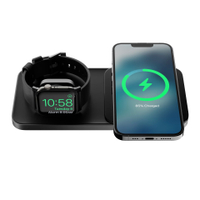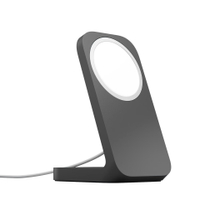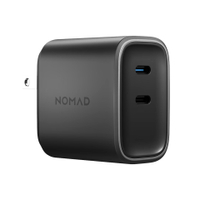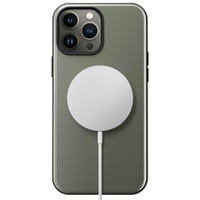Take Apple’s latest 35W Dual USB-C Port power adapter for example. It costs $59 and yet, it can’t fast-charge your laptop and phone at the same time. Nomad, on the other hand, offers a 65W dual-port charger for $70. It not only tops up two devices at max capacity but also, thanks to the GaN technology, it’s about the same size as Apple’s 35W accessory. The size difference is immense when you consider Apple’s 67W adapter. Similarly, Nomad sells a variety of other accessories that are largely intended for Apple users, such as dual MagSafe hubs, MagSafe stands for your desk, wireless chargers for simultaneously charging up to three devices, and more. We’ve been testing some of the best-sellers from Nomad’s ecosystem for the last few weeks and we’re ready to weigh in on whether you should buy them over Apple’s alternatives in that high-end price segment.
Base One Max
The Base One Max is Nomad’s flagship accessory. It’s a dual MagSafe charger that can wirelessly top up your iPhone and Apple Watch side by side. What sets this apart from similar other efforts, including Apple’s own, is the design and build quality. You can tell the Base One Max is a high-end accessory as soon as you unpack it. Its thick metallic base weighs a hefty 2 pounds, ensuring the platform doesn’t budge when you take your iPhone or Apple Watch off. It comes in handy especially given the accessory’s MagSafe magnets are quite strong and you have to do a little twist and pull motion to remove your device. The elements on top of the metallic chassis are well-built, too. On one half, you’ll find a signature white circular MagSafe disk for charging your iPhone or any other Qi-compatible device. It sits on a raised glass platform so that it’s easier to grab and check for notifications. On the other side is an upright charging puck that lets you put your Apple Watch in Nightstand Mode. The puck itself is encased in metal for a sturdier mount. Though I was initially concerned about the Base One Max’s weight, after a few weeks of use, it now seems like a no-brainer. Since the accessory always sits in the same spot at my bedside, the extra heft keeps it there when I’m constantly placing and removing my devices. For home use, this is vastly preferable to Apple’s Duo Charger, which is more portable, but the flimsy, foldable design is tough to clean and keep in place on your desk or nightstand. In addition, the Base One Max also looks nicer to fit the rest of the decor and comes in three colors: white, black, and gold. It can wirelessly fast-charge a MagSafe-supported iPhone at 15W and an Apple Watch at 5W. As it’s largely aimed at Apple devices, regular Qi-charging of other devices is limited to 7.5W. Like the Apple Duo Charger, the Base One Max needs a minimum 30W adapter to function, which you’ll have to buy separately, but Nomad does bundle a braided USB Type-C cable. The Nomad Base One Max costs $150 (although usually it is on sale for less) — $20 more than the Apple MagSafe Duo Charger and for people who regularly charge their iPhone and Apple Watch at their bedside, it’s a must-have accessory.
MagSafe Mount Stand
By far, my favorite Nomad accessory is the MagSafe Mount Stand. One of the pitfalls of switching to Face ID is that when the iPhone is lying on a flat surface like your desk, you can’t unlock it without picking it up. It’s worse when the phone is connected to a MagSafe charger because then, the added cable and magnetic pull make it an even greater challenge to face the front sensor. Enter the Nomad MagSafe Mount. It’s a single block of zinc alloy, whose only job is to hold your phone upright when it’s connected to a MagSafe puck. On its own, it appears like a refined 3D-printed item, but when you affix a MagSafe charger to it, it turns into a stand every iPhone owner sorely needs. The MagSafe Mount Stand sits at an angle that’s ideal for whether you’re on FaceTime calls or watching a video in landscape. The MagSafe disk fits in the circular housing at the top and a micro-suction tape at the back holds the cable. You can then simply place your iPhone on the tilted stand and the MagSafe magnet will instantly stick to it. The highlight of Nomad’s MagSafe Mount Stand is, of course, its weight. At 21 ounces, it may sound too heavy, but in reality, it prevents the setup from falling or moving at all when you’re poking at your phone’s screen or changing its position. The elongated rubber base offers an additional grip and keeps the stand fixed in its position. It is a bit expensive for $60, which does even not include a MagSafe cable, but to be honest, I’d still recommend it. The MagSafe Mount Stand has been a lifesaver as I had grown increasingly frustrated with Face ID. No longer do I need to pick up my iPhone to unlock it for reading a text. It may seem trivial, but for someone who sits at a desk for hours on end, it’s the best accessory I’ve invested in and solves my single biggest pet peeve with the iPhone.
65W Power Adapter
Nomad’s range of GaN-capable power adapters comes in three variants: 20W, 30W, and 65W. The presence of the GaN technology (Gallium nitride) has allowed Nomad to shrink these adapters down to a size that fits in the palm of your hand. The 65W adapter, particularly, is one of the lightest I’ve used and the collapsible prongs make for a slim and portable design. For comparison, it’s nearly half the size of Apple’s 67W adapter. It’s equipped with two USB-C PD ports and both are capable of delivering 65W power on their own. However, when you have two devices plugged in, the top port delivers 45W and the bottom, 20W. It works as expected and can fast-charge an M1 MacBook and an iPhone simultaneously. I do wish, though, that Nomad offered a 65W adapter that supplies equal power from both ports. If you plug Nomad’s Base One Max into the top port, you’ll end up wasting 15W of power, and the 20W bottom one can’t support it all. On the other hand, two 30W ports would be enough to power the Base One Max (an iPhone and an Apple Watch) as well as a MacBook Air. The Nomad 65W adapter is also pricier ($70) than the similarly-featured Anker Nano II 65W Charger ($50). The only advantage Nomad has is its adapter is slightly lighter and the smooth aluminum finish is better-looking.
Horween leather and sports cases
I’ve also had a chance to try out Nomad’s leather and sports cases. Though the former is available for iPhones as old as the XS, iPads, AirPods, and more, the latter is limited to the latest iPhone 13 series. Unlike what you’d think, the Sport Case is the highlight here. Its minimalist exterior is made out of hard plastic but don’t let the glossy look fool you. It features a confident and comfortable grip and more importantly, the anodized aluminum buttons are clicky and high-quality. Nomad says it can survive drops from up to 6 feet and I believe them: I have dropped my iPhone 13 mini twice and it has survived without any scuffs. It also has a built-in NFC chip you can configure your business card and other details to and then beam it to anyone with a tap. It costs $40 — $10 less than Apple’s Silicon cases. The leather cases are impressive too and as you’d expect, the Horween material feels authentic instead of factory-processed and is a joy to hold. You can get it in a Folio or a standard case form factor. However, it’s a bit expensive at $70, which is $10 more than Apple’s.



